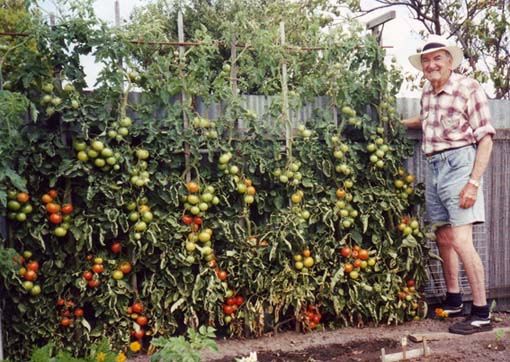 The "Tomato Man", Steve Morant
The "Tomato Man", Steve Morant By Catherine Watson
THE ladies are talking fascinators, the punters are talking odds, the best horses in the country are raring to go. It can mean only one thing … time to put in the tomatoes.
Melbourne Cup Day, the first Tuesday in November, is traditionally the day when home gardeners take a calculated punt and plant out their tomato seedlings, trusting that the odds of a late frost are now at least 100-1.
THE ladies are talking fascinators, the punters are talking odds, the best horses in the country are raring to go. It can mean only one thing … time to put in the tomatoes.
Melbourne Cup Day, the first Tuesday in November, is traditionally the day when home gardeners take a calculated punt and plant out their tomato seedlings, trusting that the odds of a late frost are now at least 100-1.
Tomatoes are among the most satisfying vegetables to grow because there’s such a huge difference between the store-bought varieties, selected for their ability to stand up to being dropped on the floor, and the sweet, tart, thin-skinned, flavoursome ones we grow at home.
They’re reasonably easy to grow but there are a few rules that can shorten the odds of a good crop:
Most of the little I know about tomatoes came from Steve Morant, Wonthaggi’s legendary “Tomato Man”, who kept half of Wonthaggi supplied with plants and tomatoes.
Steve had many interests but only one passion: growing tomatoes. He used to sow his seeds in a glasshouse in September and go out twice a day to turn the seedlings to ensure they didn’t grow crooked following the weak winter sun.
He grew only one variety, the Vivian, which he bought for 25 years from a small company called New Gippsland Seeds. His tomatoes grew like bunches of super-sized grapes up plants that were well over two metres high, with stems as thick as broomsticks.
His secrets, which have never been revealed before: a weekly feed with a weak solution of liquid manure. He also removed all the leaves from the base of the plant and all the laterals, which are the shoots that grow between the main stem and the branches.
As he removed the laterals, he used to plant them out to make new plants for the many fans he had attracted over the years.
When New Gippsland Seeds announced in 2005 that it would no longer sell Vivian seeds, Steve visibly wilted and died just a couple of years later. In all fairness to the seed company, he was in his 90th year.
One final warning: even Steve had bad years when all his tomato plants got the blight. In gardening, as in horse racing, there’s no such thing as a sure thing.
They’re reasonably easy to grow but there are a few rules that can shorten the odds of a good crop:
- Rotate your tomatoes to a different spot each year to reduce the chance of disease.
- Most tomato plants require staking. Many grow to two metres or more, so it needs to be a substantial stake. If you’re planting a few, you’ll probably find it easier to plant them against a wall or fence.
- If you’re slack, like me, you’ll find it easier to plant bush varieties, although you won’t get the same range.
- You want them to get the morning sun but don’t plant them where they will cop the fierce late afternoon summer sun. That can kill anything.
- Don’t use too much nitrogen fertiliser. It’s the fruit you’re interested in, not the leaves.
- Water the soil around the plant, not the leaves.
Most of the little I know about tomatoes came from Steve Morant, Wonthaggi’s legendary “Tomato Man”, who kept half of Wonthaggi supplied with plants and tomatoes.
Steve had many interests but only one passion: growing tomatoes. He used to sow his seeds in a glasshouse in September and go out twice a day to turn the seedlings to ensure they didn’t grow crooked following the weak winter sun.
He grew only one variety, the Vivian, which he bought for 25 years from a small company called New Gippsland Seeds. His tomatoes grew like bunches of super-sized grapes up plants that were well over two metres high, with stems as thick as broomsticks.
His secrets, which have never been revealed before: a weekly feed with a weak solution of liquid manure. He also removed all the leaves from the base of the plant and all the laterals, which are the shoots that grow between the main stem and the branches.
As he removed the laterals, he used to plant them out to make new plants for the many fans he had attracted over the years.
When New Gippsland Seeds announced in 2005 that it would no longer sell Vivian seeds, Steve visibly wilted and died just a couple of years later. In all fairness to the seed company, he was in his 90th year.
One final warning: even Steve had bad years when all his tomato plants got the blight. In gardening, as in horse racing, there’s no such thing as a sure thing.